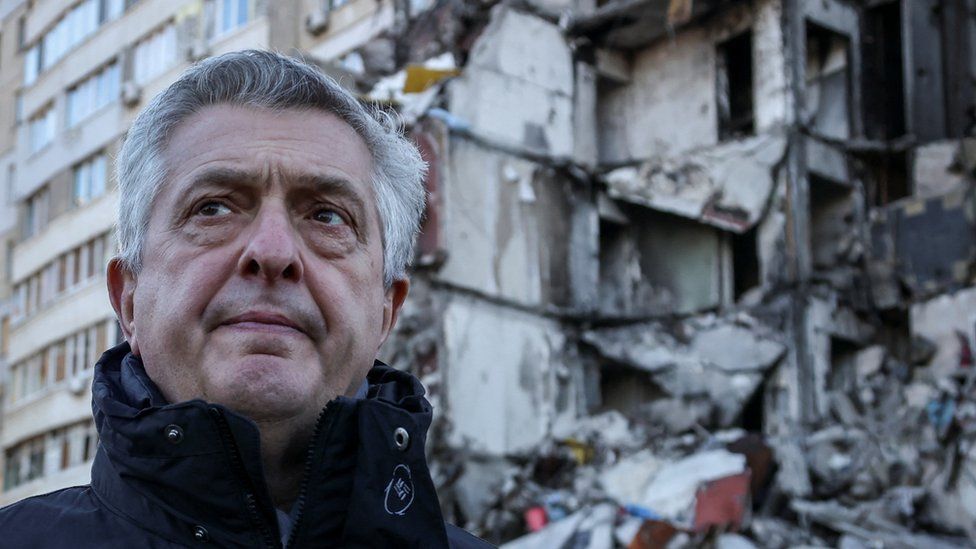ARTICLE AD BOX
 Image source, Reuters
Image source, Reuters
Filippo Grandi has been visiting Ukraine to assess the situation as that conflict continues
A top UN official has voiced concerns over the UK government's 'stop the boats" policy which he says is a "fake response" to migration issues.
Rishi Sunak's promise to "stop the boats" was one of his government's five priorities for 2023 the PM set out at the start of last year.
But Filippo Grandi, the UN high commissioner for refugees, said migrants are "easy targets".
The Home Office denied relinquishing its responsibilities.
Ahead of a US presidential election and a general election in the UK, both within a year, Mr Grandi admitted there is pressure from electorates over immigration issues in the respective countries.
"But that is largely induced by politicians who are fuelling it," he told BBC Radio 4's Today programme.
"Manipulating it often through a whole set of fake news to gain votes."
"Migrants, refugees are easy targets. It is much less sexy and attractive to say 'we need to roll up our sleeves and work on these issues' rather than saying 'let's push them back and that will solve all our problems' - which it won't."
Mr Grandi was asked by Today presenter Nick Robinson if he is referring to the UK's "stop the boats" policy and Donald Trump's "build a wall" policy.
"Exactly," Mr Grandi answered.
"Those are fake responses which don't address even the problem of arrivals.
"The risk is there is only attention on that at the expense of the real difficult work which needs to be carried out to better manage these complex thoughts."
Speaking from Kyiv, the capital of Ukraine, Mr Grandi also expressed his concerns over the UK government's Rwanda asylum scheme.
Currently going through Parliament, the proposed five-year agreement would see some asylum seekers arriving in the UK being sent to Rwanda to have their claims processed there.
Image source, Reuters
Image caption,Legal challenges meant the first Rwanda flight was cancelled shortly before take-off in June 2022
Under the plans, if successful, they could be granted refugee status and allowed to stay in the central African nation. If not, they could apply to settle in Rwanda on other grounds or seek asylum in another "safe third country".
But, in November 2023, the UK Supreme Court ruled unanimously that the Rwanda scheme was unlawful.
After the Supreme Court ruling, the government introduced a new bill to make clear in UK law that Rwanda is a safe country.
Mr Grandi told the BBC that some countries with "more resources" are devising "systems with which they would abdicate responsibilities they have to asylum seekers and shift these responsibilities to other states. This is contrary to the basic principles of refugee protection".
"It is important all people seeking asylum have access to fair procedures, especially countries which are signatories to conventions," Mr Grandi said.
"If that responsibility is renounced, is given away, because you want to keep people away from your borders, then this will always meet our [the UN's] disapproval."
A Home Office spokesperson said: "The UK is not abdicating its responsibilities as has been alluded to by the UNHCR - this is a partnership with a safe country that cares deeply about refugees, and currently hosts over 130,000 asylum seekers.
"Both the Court of Appeal and the High Court found that the principle of relocating individuals to safe third countries to have their asylum claims processed is consistent with the UK's obligations under the Refugee Convention. The Supreme Court did not disturb this."
Last week, the Home Office said it is committed to preventing small boats crossing the English Channel from France.
"Our priority is to stop the boats, which is why we have taken robust action to crack down on vile people-smuggling gangs, deter migrants from making dangerous crossings and, alongside our French counterparts, intercept vessels," a spokesperson said.

 11 months ago
20
11 months ago
20








 English (US) ·
English (US) ·